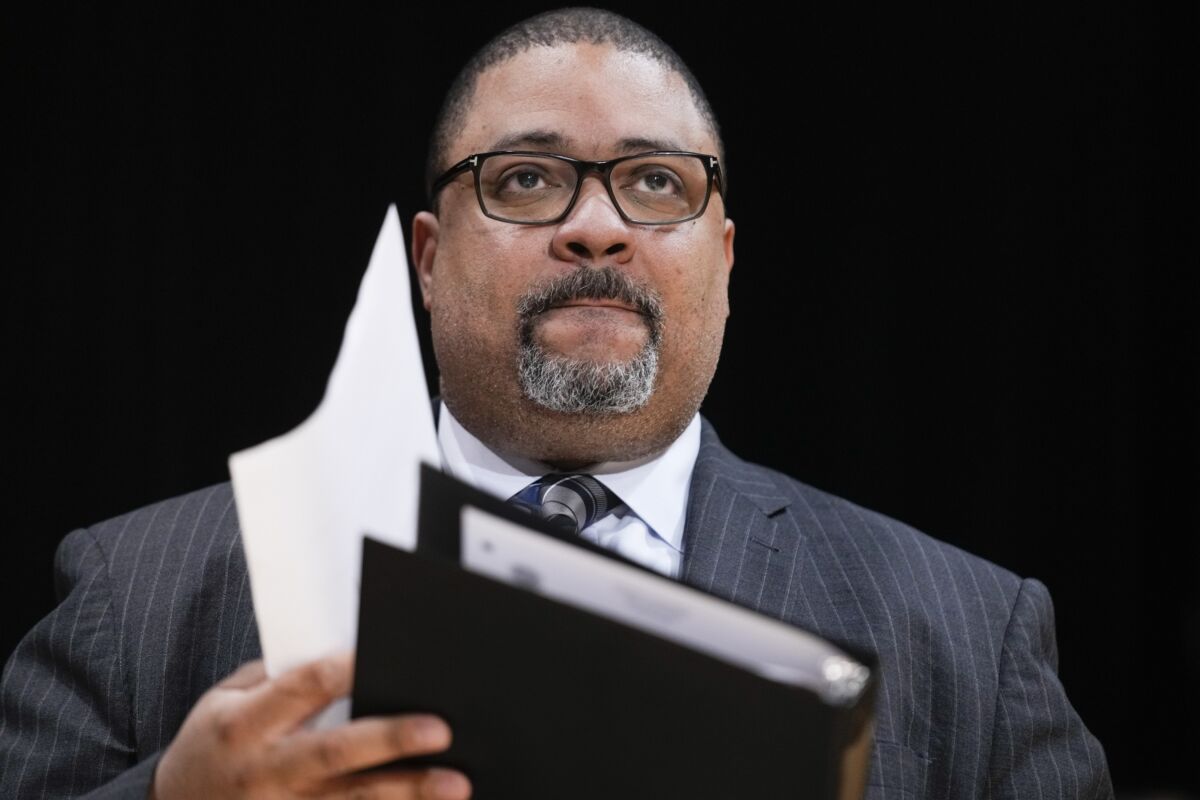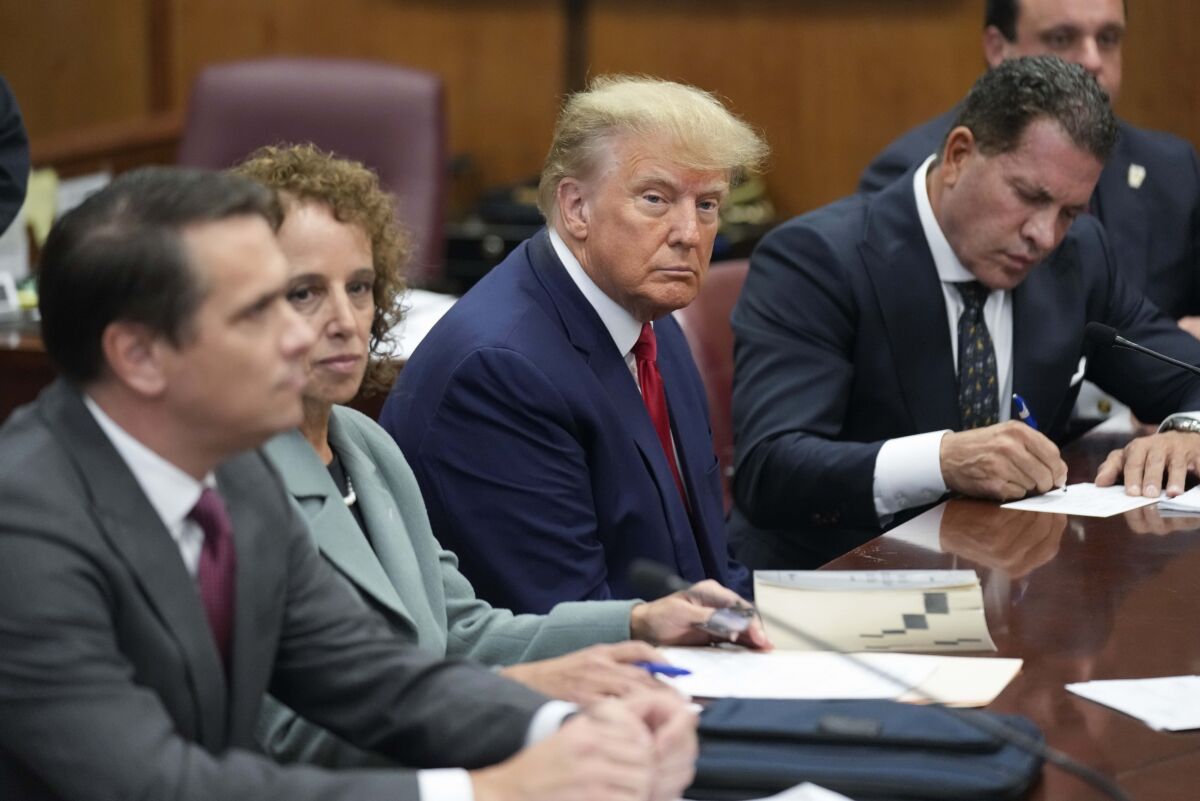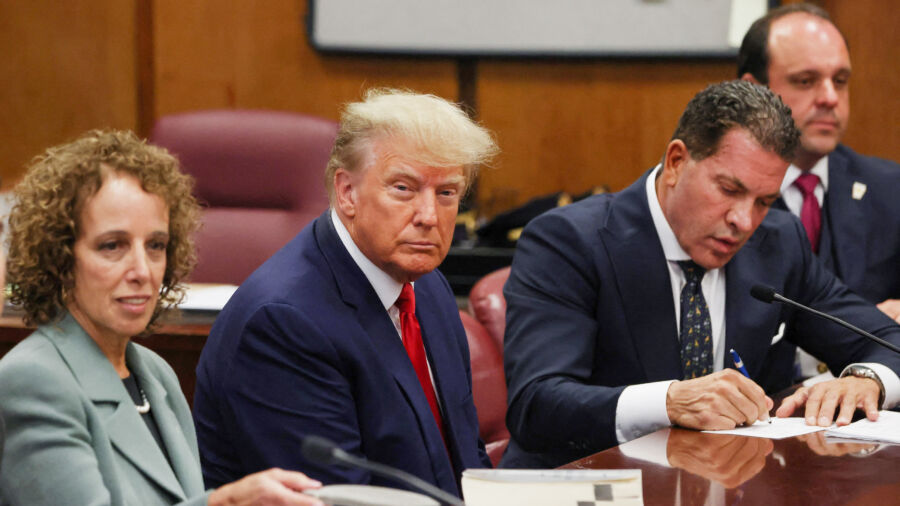Manhattan District Attorney Alvin Bragg’s office said in court filings that it opposes former President Donald Trump’s effort to move a “hush money” case to a federal court.
Bragg argued in documents filed in U.S. District Court in Manhattan (pdf) that Trump is not entitled to a venue change for the state criminal case because the former president is not a federal officer.
“He does not plausibly meet the required elements to justify removal to federal court,” Bragg said in the filing.
Trump, who has been charged by Bragg with falsifying business records connected to an alleged “hush money” payment to adult film actress Stormy Daniels prior to the 2016 election, has called the case a politically-motivated “witch hunt.”

‘Travesty of Justice’?
Lawyers representing Trump previously requested that the case be moved out of New York state court, arguing that the charges related to alleged conduct while Trump was president.
A Trump spokesperson did not immediately respond to a request for comment on Bragg’s latest filing. However, a Trump spokesperson said in a May 31 statement obtained by The Epoch Times that Bragg’s case “has no factual or legal merit, having been brought by a District Attorney who ran on a platform of ‘Get Trump.'”
“An impartial judge is vital to stop this travesty of justice,” the spokesperson added.
Trump has been charged with 34 felony counts of falsifying business records in connection to payments that his campaign made ahead of the 2016 election to silence allegations about an alleged affair between Daniels and Trump. The former president has denied the affair and any wrongdoing in the case.
Bragg said in the filing that Trump’s lawyers failed to establish that the former president meets any one of three criteria that would justify a federal-officer removal to a federal court.
“Federal-officer removal is available only when (1) a federal officer (2) faces criminal charges for conduct arising under color of his office and (3) identifies a colorable federal defense,” Bragg wrote.
The inability of a defendant to satisfy even one of those conditions is justification to deny requests to move the case to a federal court, Bragg argued.
Trump’s alleged criminal conduct had no connection with his official duties while president but came before he was elected, the Manhattan DA said in the filing.
“Defendant also has invoked no colorable federal defense because there is no plausible basis to invoke official immunity for his unofficial actions,” the filing states.
There is also a “serious question” as to whether the president of the United States is an “officer” under the law and so may not be entitled to invoke removal of a case to a federal court, Bragg argued.
“Because defendant has failed to identify a colorable ground for federal-officer removal, this criminal prosecution should be returned to New York state court,” the filing reads.
Trump’s indictment by Bragg earlier this year became the first time a sitting or former president was charged criminally.
His trial is scheduled for March 25, 2024, a time when Trump’s 2024 presidential campaign will be in full swing.

Trump Appears for Hearing
Trump recently appeared remotely in the Manhattan Criminal Court to hear a judge’s instructions on the former president’s handling of discovery evidence in the hush money case.
The hearing was Trump’s first appearance after he pleaded not guilty in April to multiple counts of falsifying business records related to alleged payments made to Daniels.
Judge Juan Merchan of the New York Supreme Court told Trump, who appeared via video conference, that he signed a protective order on discovery evidence in the case on May 8 and that a protective order (pdf) is in place limiting what Trump can do with the materials.
Specifically, the protective order limits what materials Trump can view and where he can view them. It also bars him, or anyone on his team, from leaking the discovery materials to the public.
These discovery materials include grand jury minutes and exhibits, witness statements, materials related to subpoenas, and Bragg’s office’s internal emails, according to Manhattan DA prosecutors’ statements made during Trump’s arraignment hearing in April.
The judge told Trump and his lawyer Todd Blanche that a violation of the protective order could result in sanctions, including charging Trump with contempt of court, which is a criminal charge that could result in fines or imprisonment.
Prosecutors from Bragg’s office argued in a court filing (pdf) on April 26 that Trump should be forbidden from sharing discovery evidence with the media or the public.
This protective order is needed, the prosecutors claim, to protect “witnesses, investigators, prosecutors, trial jurors, grand jurors, judges, and others involved in legal proceedings against” Trump from being harmed in case Trump publishes those materials.
Blanche said during the hearing that because Trump is “running for the President of the United States, he very much is concerned that his first amendment rights are being violated.”
The judge said in response that the protective order is “certainly not a gag order” and that it is not his intention to impair Trump’s ability to campaign for president.
Trump reacted by saying that the restrictions amount to election interference.
“Just had New York County Supreme Court hearing where I believe my First Amendment Rights, ‘Freedom of Speech,’ have been violated, and they forced upon us a trial date of March 25th, right in the middle of Primary season. Very unfair, but this is exactly what the Radical Left Democrats wanted,” Trump wrote in a post on Truth Social shortly following the hearing.
“It’s called ELECTION INTERFERENCE, and nothing like this has ever happened in our Country before!!!” Trump wrote.
Trump’s Indictment
Following Trump’s arraignment in April, the 16-page indictment and 13-page statement of facts (pdf) allege that Trump falsified records related to multiple payments made to prevent the surfacing of negative information about him.
Prosecutors allege that Trump directed one of his lawyers, Michael Cohen, during the 2016 presidential election to pay Daniels $130,000 to prevent her from going public about an alleged affair between her and Trump in 2006.
Court filings allege that Trump then reimbursed Cohen through monthly checks and documented that payment as legal expenses in the Trump Organization, leading to 34 false entries in New York business records.
A felony falsifying records charge requires a prosecutor to prove that it was done with the intent to hide the commission of a second crime.
The indictment and court documents do not specify this second crime. But Bragg, at a press conference following the indictment hearing, mentioned three possibilities: a violation of state election law that bars any conspiracy to promote a candidate “by unlawful means,” a violation of a federal cap on campaign contributions, or a violation of state tax law.
Alan Dershowitz, a professor who taught at Harvard Law School for nearly 50 years, expressed skepticism of the legal grounds supporting Bragg’s case, saying he is using “made-up laws” to muster a politically motivated attack.
“Nobody should ever be arrested based on made-up laws or combining a federal and state statute,” Dershowitz told The Epoch Times in an interview in March when news broke that Trump could be criminally charged. “I taught criminal law for 50 years at Harvard, and the one rule was, no creativity is permitted by prosecutors. The law has to be clear.”
“It’s not a righteous prosecution. It’s not a just prosecution. And I think every libertarian, whether you’re conservative, or liberal, should be opposed to it,” he said.
Gary Bai contributed to this report.
From The Epoch Times


